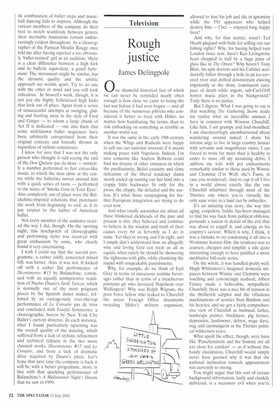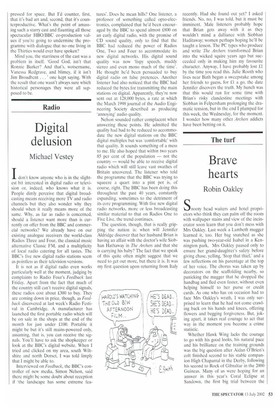Rough justice
James Delmgpole
0 tie shameful historical fact of which we can never be reminded nearly often enough is how close we came to losing the last war before it had even begun — and all because of the numerous pillocks who considered it better to treat with Hitler, no matter how humiliating the terms, than to risk embarking on something as terrible as another world war.
It was the same in the early 19th century when the Whigs and Radicals were happy to sell out our national interests if it meant making peace with Napoleon. Indeed, I'm sure someone like Andrew Roberts could find me dozens of other instances in which the pusillanimity, Belial casuistry and slimy defeatism of the liberal tendency damn nearly ended up turning our fair land into a crappy little backwater fit only for the pious, the chippy, the deluded and the useless. It's what those campaigning for further European integration are trying to do even now.
And what totally astonishes me about all these blinkered dickheads of the past and present is this: they believed and continue to believe in the wisdom and truth of their causes every bit as fervently as I do in mine. Yet they're wrong and I'm right, and I simply don't understand how an allegedly wise and loving God can treat us all as equals, when surely he should be showering the righteous with gifts, while chastising the stupid with unspeakable punishments.
Why, for example, do we think of Earl Grey in terms of innocuous teatime beverages rather than in terms of a treacherous patrician git who favoured Napoleon over Wellington? Why was Ralph Wigram, the poor brave fellow who leaked to Churchill the secret Foreign Office documents revealing Hitler's military expansion, allowed to lose his job and die in ignominy while the FO appeasers who helped destroy him — I bet — enjoyed long, happy lives?
And why, for that matter, wasn't Ted Heath plagued with boils for selling out our fishing rights? Why, for having helped ruin London twice now, hasn't Ken Livingstone been chopped in half by a huge pane of glass like in The Omen? Why haven't Tony Blair, his spin doctors and his Cabinet accidentally fallen through a hole in an ice-covered river and drifted downstream clawing impotently at the shiny, translucent carapace of death while urgent, sub-Carl-Orff horror music plays in the background? Truly there is no justice.
But I digress. What I was going to say is that watching The Gathering Storm made me realise what an incredible amount I have in common with Winston Churchill. Like him, I am grumpy and foul-mouthed; I am disconcertingly unembarrassed about wandering around naked; I share his intense urge to live in large country houses with servants and magnificent views; I am forced to write far more than is healthy in order to stave off my mounting debts; I address my wife with pet endearments remarkably similar to those used by Winnie and Clemmie (I'm Wolf, she's Fawn, in case you wondered). And to cap it all I live in a world almost exactly like the one Churchill inhabited through most of the Thirties: one where you're virtually the only sane voice in a land run by imbeciles.
It's an amazing true story, the way this aging, corpulent, baldie has-been managed to find his way back from political oblivion, persuade a nation in denial of the evil that was about to engulf it, and emerge as his country's saviour. Which is why, I think, it was a mistake to try condensing it all into a 90-minute feature film: the tendency was to coarsen, cheapen and simplify a tale quite interesting enough to have justified a more meditative full-scale series.
On the whole, it was handled pretty well. Hugh Whitemore's imagined domestic setpieces between Winnie and Clemmie were touching and convincingly realised; Albert Finney made a believable, sympathetic Churchill; there was a nice bit of tension in the thrillerish subplot and the villainous machinations of scowler Stan Baldwin and his heavies; and we got a fairly comprehensive view of Churchill as husband, father, landscape painter, bricklayer, pig farmer, depressive, landowner, debtor, wage slave, wag and curmudgeon in his Thirties political wilderness years.
What spoilt the effect, though, were lines like Passchendaele and the Somme are all too close for comfort' — as if without this handy elucidation, Churchill would simply never have guessed why it was that the national inclination towards appeasement was currently so strong.
You might argue that this sort of instant background information, lazily and clunkily delivered, is a necessary evil when you're pressed for space. But I'd counter, first, that it's bad art and, second, that it's counterproductive. What's the point of amassing such a starry cast and flaunting all those spectacular HBO/BBC co-production values if you're going to undermine the programme with dialogue that no one living in the Thirties would ever have spoken?
Mind you, the starriness of the cast was a problem in itself. 'Good God, isn't that Ronnie Barker? And that's, wotsername, Vanessa Redgrave, and blimey, if it isn't Jim Broadbent . ' one kept saying. With the result that one wasn't always sure which historical personages they were all supposed to be.



































































 Previous page
Previous page